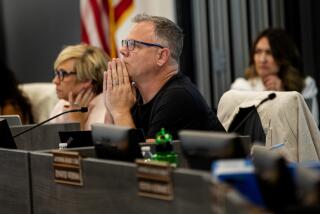Complexity May Have Doomed Recall Bid
- Share via
Leaders in the effort to oust two Westminster School District trustees over their stance on a state anti-discrimination law appeared to seize the perfect moment last April when they rose before a sea of parents and teachers at a heated board meeting.
As the crowd erupted in cheers at word of a possible recall, organizers said they would succeed in gathering the necessary signatures.
But Thursday, the momentum of that April evening seemed so long ago when organizers learned they fell short of the required 7,233 signatures and that the Orange County registrar’s office rejected the recall bid. With the failure, the Westminster group’s effort joins a long list of unsuccessful recall attempts. Their opponents say the defeat shows that the campaign lacked critical support. Political experts, however, said that while the trustees have their supporters, a host of problems -- namely bad timing and the issue’s complexity -- doomed the effort.
“They failed because recall campaigns are just plain hard to do,” said Mark Petracca, a UC Irvine political scientist.
The recall attempt stemmed from rejection by Judy Ahrens, Blossie Marquez and Helena Rutkowski of a state anti-discrimination regulation meant to protect transsexuals and others who do not conform to traditional gender roles. Citing their Christian beliefs, the three called the rule immoral because it allows people to define their gender. Rutkowski, whose term is expiring but who is seeking reelection, was not a target.
Although the three trustees, who constitute a majority of the five-member board, eventually rewrote district policies to appease the state and avoid millions of dollars in sanctions, parents and teachers still fumed.
The timing of the recall effort perhaps hurt the campaign’s chances the most, said Petracca and Louise MacIntyre, a parent who led the recall effort. Throughout June, volunteers eagerly canvassed neighborhoods gathering signatures. But as the July Fourth weekend approached, families began to disperse for summer holidays.
Sustaining enthusiasm is difficult at any time of year, Petracca and other political campaign experts said, but summer is the worst time to try to gather signatures.
MacIntyre said organizers quickly abandoned the idea of a grass-roots campaign, but then lost several days in early July as they struggled to hire a professional signature-gathering firm.
The complexity of the debate over the state gender law also played against recall supporters. In the early weeks, as they went door to door, volunteers struggled to quickly and clearly explain the issues.
“This was not as simple as whether or not they supported a Wal-Mart Superstore,” Petracca said. “It was a much more complicated issue.”
Political strategist Adam Probolsky agreed, saying recall organizers failed to effectively counter the trustees’ claim that the law endangers students because it allows for transgender or cross-dressing teachers. “Whatever their pitch was, “it’s hard for a parent to get over the ‘Mr. Jones in a dress’ argument.”
Petracca and Probolsky emphasized that the campaign lost more momentum when state education officials backed off their threats to withhold funding, giving voters the impression that the debate had been resolved.
MacIntyre said recall supporters would now turn their attention to defeating Rutkowski’s re-election bid. After having tried and failed once, the idea of starting from scratch seems impossible. “I didn’t understand that this community wasn’t ready for this,” she said.
More to Read
Sign up for Essential California
The most important California stories and recommendations in your inbox every morning.
You may occasionally receive promotional content from the Los Angeles Times.













